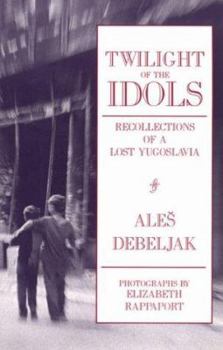Twilight of the Idols: Recollections of a Lost Yugoslavia
Memoir. Translated from the Slovenian by Michael Biggins. This description may be from another edition of this product.
Format:Paperback
Language:English
ISBN:1877727512
ISBN13:9781877727511
Release Date:January 1995
Publisher:White Pine Press (NY)
Length:86 Pages
Weight:0.35 lbs.
Dimensions:0.3" x 5.5" x 8.5"
Customer Reviews
2 ratings
A Unique Perspective on What Was Lost
Published by Thriftbooks.com User , 19 years ago
Simply beautiful. Amidst the outpour of dry political/historical literature that attempted to explain and contextualize the breakup of Yugoslavia, Debeljak's essay represents a very unique perspective of Yugoslavia's brilliant popular culture as a symbol of the new energy, creativity, and initiative that had come to characterize the first truly Yugoslav generations: that young segment of society that, if not obstructed by politics and warmongering, could very well have led the peoples of this southwest Balkan state towards an era of a truly "cosmopolitan" national identity. Debeljak laments the creative, constructive and truly "Yugoslav" intellectual and cultural force that was supressed and destructed by the wars of the 90s. His work provides a unique perspective of a frequently overlooked aspect of Yugoslav identity which many today claim never existed. The emotional force of the writing of this X-Yugoslav additionally proves that it did.
If only...
Published by Thriftbooks.com User , 22 years ago
When first published about a decade ago, Debeljak's essay was met with harsh criticism in many of the republics of the former Yugoslavia (and not just there) as being a sappy example of `Yugo-nostalgia.' This was particularly true of Croatia and Debeljak's native Slovenia. This despite the fact that the entire first section of the book is a rather harsh condemnation of those nationalist regimes that waged the wars on Yugoslavia's ruins, and the accusations Debeljak levels at Milosevic and the Serbian nationalists who initiated the entire process (indeed, at one point he poses the question, perhaps more relevant now than when the essay was first published: "who still remembers Vukovar?"). But this is not really a lament over the country in the form that it collapsed; instead it reads more like an eloquent epitaph to the culture that once existed in Yugoslavia, and to the Yugoslavia that could have been. In this sense, he calls on all people of the former Yugoslav republics to remember the past in all its complexity, to prevent their memories from being `ethnically cleansed' as well. Despite all of the rhetoric that followed Yugoslavia's break-up about the nature of that now-defunct state, Debeljak boldly declares that he remembers a time when things did not seem so inevitable, when conflict did not seem to be the only alternative.





